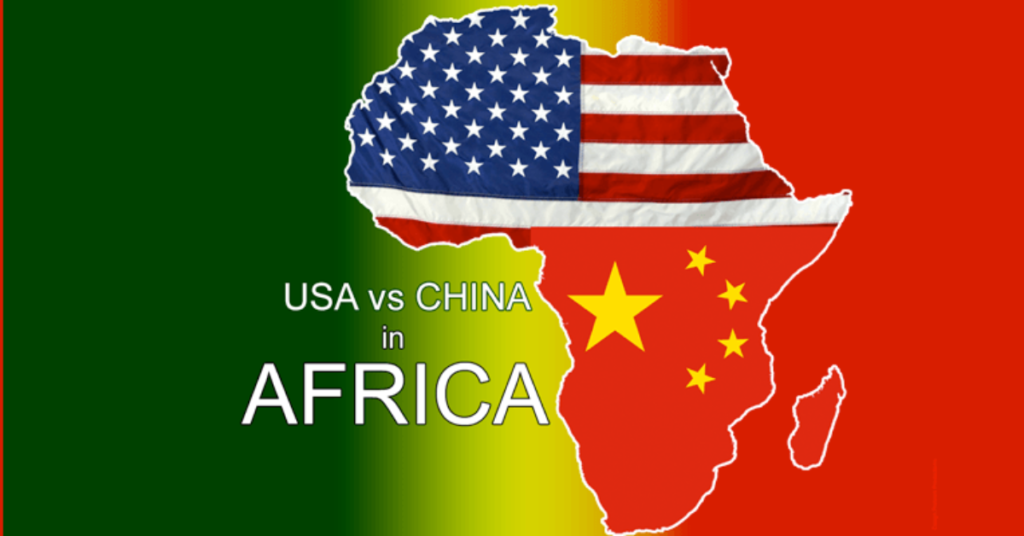In the intricate tapestry of global geopolitics, the maneuvers of superpowers shape not only international relations but also the economic destinies of nations. The recent unveiling of the USA’s Lobito Corridor in the African continent represents a pivotal moment in this geopolitical landscape, as it signifies a strategic response to China’s burgeoning influence through its Belt and Road Initiative (BRI). To comprehend the significance of this development and its implications, let’s embark on an in-depth exploration of the Lobito Corridor and its far-reaching consequences.

Understanding China’s Belt and Road Initiative
China’s Belt and Road Initiative (BRI) stands as a testament to its ambition on the global stage. Initially conceived as a means to revitalize ancient trade routes, the BRI has evolved into a multifaceted strategy aimed at enhancing connectivity and fostering economic cooperation across continents.
Expansion into Africa
Africa, with its vast resources and burgeoning markets, emerged as a focal point of China’s BRI expansion. Leveraging its economic prowess, China embarked on a spree of infrastructure investments, forging agreements with numerous African nations in exchange for access to resources and geopolitical influence. The BRI’s success in Africa not only bolstered China’s economic clout but also posed a formidable challenge to traditional powers vying for dominance in the region.
The USA’s Strategic Response: The Lobito Corridor Initiative
In response to China’s growing footprint in Africa, the USA has unveiled its Lobito Corridor initiative, signaling a strategic recalibration of its African policy. The Lobito Corridor, spanning across four key African nations, serves as a tangible manifestation of America’s determination to assert its influence and counterbalance the expanding reach of the BRI.
Strategic Imperatives
The Lobito Corridor initiative is underpinned by a set of strategic imperatives that reflect America’s geopolitical calculus:
1. Economic Expansion
At its core, the Lobito Corridor seeks to advance America’s economic interests in Africa. By establishing a direct transport route, the USA aims to facilitate the extraction and transportation of vital resources, such as copper from the Democratic Republic of Congo, thereby bolstering its economic foothold in the region.
2. Geopolitical Maneuvering
Beyond economic considerations, the Lobito Corridor is a manifestation of America’s geopolitical maneuvering in Africa. By deepening ties with countries along the corridor, the USA aims to diminish China’s influence and reaffirm its position as a key player in African geopolitics.
Infrastructure Development
Central to the Lobito Corridor initiative is the development of critical infrastructure, including railways, ports, and logistical networks. Through strategic investments in infrastructure, the USA seeks to enhance connectivity within Africa and beyond, fostering economic growth and regional integration.
Economic Opportunities
The Lobito Corridor presents significant economic opportunities for African nations, ranging from job creation to enhanced trade and investment. By improving transportation infrastructure, the corridor reduces logistical barriers and facilitates the movement of goods and services, stimulating economic activity and promoting development.
Environmental Sustainability
Amidst the economic and geopolitical considerations, the Lobito Corridor initiative underscores the importance of environmental sustainability. As infrastructure projects progress, stakeholders must prioritize eco-friendly practices and minimize ecological impacts to preserve Africa’s rich biodiversity and natural resources for future generations.
Implications for African Geopolitics and Beyond
The emergence of the Lobito Corridor carries profound implications for African geopolitics and the broader international landscape.
1. Intensified Competition
The Lobito Corridor intensifies the competition for influence between global powers in Africa. As the USA and China vie for supremacy, African nations find themselves at the epicenter of a geopolitical tug-of-war, navigating complex alliances and partnerships to safeguard their interests.
2. Economic Dynamics
While the Lobito Corridor promises economic opportunities for African nations, it also raises concerns about dependency and neocolonialism. As foreign powers deepen their engagement, African governments must tread cautiously to ensure equitable development and sustainable growth.
3. Regional Stability
The geopolitical rivalry between global powers has the potential to impact regional stability in Africa. Competing interests may exacerbate existing conflicts or ignite new tensions, underscoring the imperative of diplomatic efforts to promote peace and security.
4. Infrastructure Development
The Lobito Corridor’s emphasis on infrastructure development holds the potential to transform Africa’s economic landscape. By enhancing connectivity and facilitating trade, the corridor paves the way for sustained growth and development across the continent, empowering African nations to harness their full potential.
Conclusion: Navigating the Complexities of African Geopolitics
In conclusion, the unveiling of the USA’s Lobito Corridor represents a significant inflection point in African geopolitics, signaling a new chapter in the competition for influence among global powers. As the USA seeks to counterbalance China’s BRI, the implications for African nations are profound, with far-reaching consequences for economic development, regional stability, and environmental sustainability. In navigating these complexities, African governments must assert their agency and forge partnerships that prioritize their long-term interests and aspirations.
Thanks for Visiting Us In Focus!
For DMCA complaints, please visit our DMCA Form / Report Content
Follow us on other platforms as follows:
Facebook – https://www.facebook.com/usinfocus
X (formerly Twitter) – https://twitter.com/usinfocusdotcom